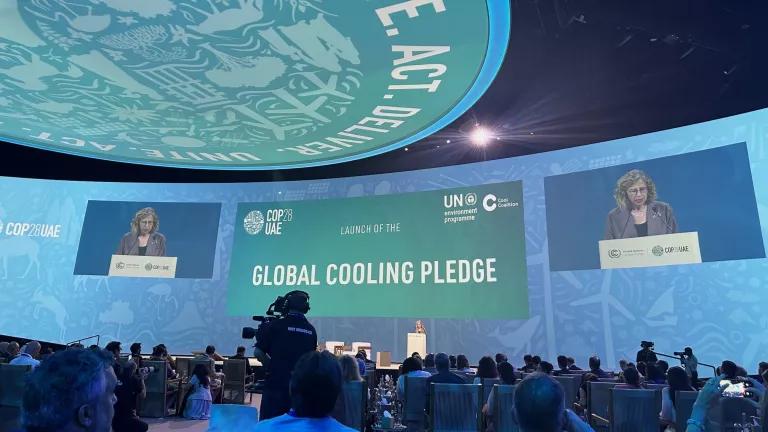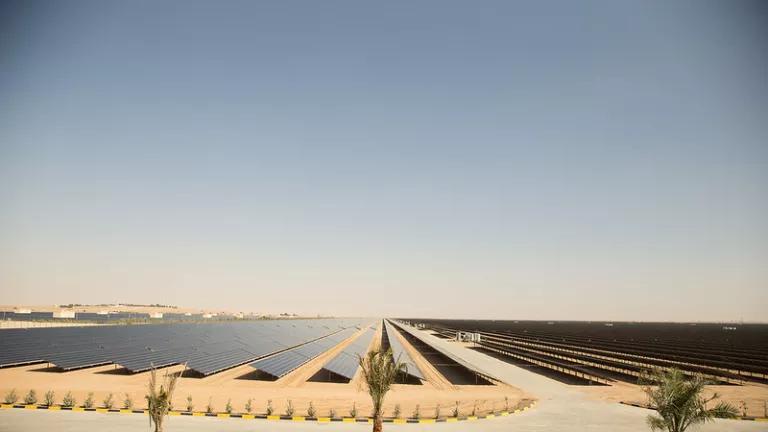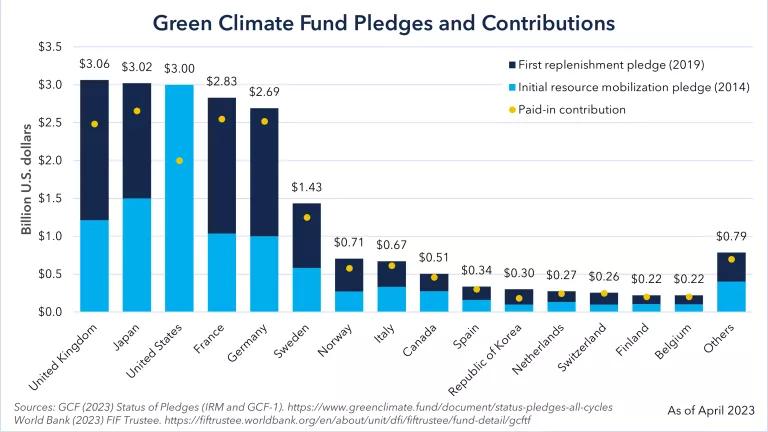Financing Climate Action: Montreal Protocol Highlights
Countries discuss the amount of funding for the Montreal Protocol's phase down of heat-trapping HFCs for 2021 to 2023, with current funds ending this December. Sustainable cooling is the hot topic in side discussions, especially in light of COVID-19.
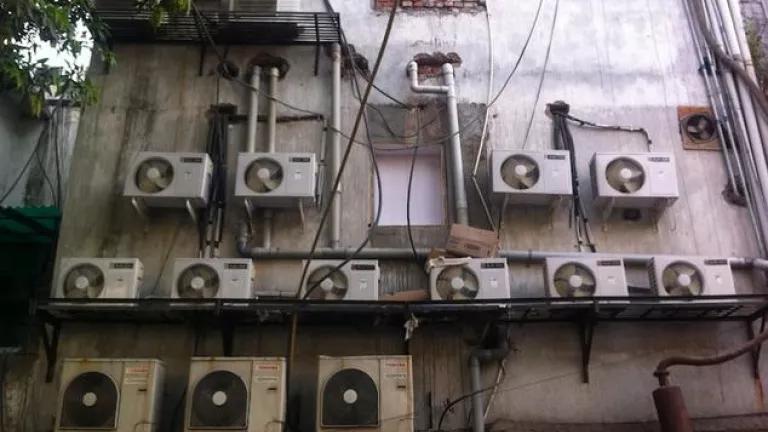
Air conditioner units in India.
Co-authored with Prima Madan
Delegates from around the world gathered for the mid-year meeting of the Montreal Protocol – a critical treaty for driving climate action. With the COVID-19 pandemic, the discussion was held online. The discussion focused on the replenishment of the Multilateral Fund, which is vital to implementing the Montreal Protocol and its Kigali Amendment – the global deal to phase down heat-trapping hydrofluorocarbons (HFCs). Funding and implementation are priorities for India, given the India Cooling Action Plan’s (ICAP) aim to phase down HFCs and to sustainably meet the country’s skyrocketing cooling demand.
HFCs are potent greenhouse gases used in air conditioning and refrigeration, for making insulating foams, and in some aerosols and other products. Though only 1-2% of total annual greenhouse gas emissions, HFCs are the fastest growing climate pollutants because of the increasing demand for air conditioning and refrigeration in developing markets such as India. The Kigali Amendment commits to reduce more than 85% of HFC-use worldwide over the coming decades, avoiding as much as 0.5°C of further warming.
The ICAP incorporates the Kigali Amendment targets as well as strategies to meet India’s growing cooling demand. Led by the Ministry of Environment, Forests and Climate Change (MOEFCC), the ICAP combines innovative cooling strategies that phase down HFCs, save energy, improve climate resilience, and curb climate change. The ICAP initiatives include thermal comfort, energy efficiency through building design and cool roofs, and standards and labeling for efficient appliances.
NRDC and partners continue to work on phasing down HFCs and meeting India’s cooling demand through our efforts on the Montreal Protocol, the ICAP, and local cooling initiatives in India.
Multilateral Fund Replenishment
Countries met virtually for the 42nd Open-Ended Working Group (OEWG) earlier this summer to discuss the proposed replenishment for the Multilateral Fund (MLF) for the period 2021 to 2023. The Montreal Protocol’s Technology and Economic Assessment Panel (TEAP) presented findings on the appropriate level of the replenishment.
The purpose of the MLF is to assist developing countries to comply with the Montreal Protocol. The virtual discussion focused on the funding needed for phasing out hydrochlorofluorocarbons (HCFCs) and phasing down HFCs. HCFCs were developed as transitional substitutes ozone depleting substances (ODS) and are scheduled for a global phaseout under the Montreal Protocol, in addition to the HFC phase down.
The approximate funding requirements for the MLF ranged from $376,697,000 to $808,706,000. Since the current round of MLF funds end this December, it is critical that countries come together and determine the replenishment amounts for effective implementation during the Meeting on the Parties in November 2020.

TEAP, Study on the 2021-2023 Replenishment of the Multilateral Fund for Implementation of the Montreal Protocol (July 2020).
During the online discussion, the TEAP summarized that the MLF has supported 148 developing countries by providing $3.73 billion (including support costs) in project funding and capacity building. The MLF has supported the phase out over 283,000 ozone-depleting-potential (ODP)-tonnes in consumption and 188,920 ODP-tonnes in production of ODS. The total income received by December 2019 was $4.07 billion. A group of donor countries also contributed an additional $25.5 million to finance fast-start activities for the implementation of the HFC phase-down.
As the International Institute for Sustainable Development (IISD) highlighted, “issues raised by parties during the discussions included: creating centers of excellence for those countries whose consumption of ozone-depleting substances classifies them as low-volume-consuming countries to aid in capacity building; considering the potential impact of COVID-19 on preserving the ozone infrastructure and implementation of future activities; and insufficient funding for institutional strengthening.”
Another main issue is ratification of the Kigali Amendment. The good news is that over 100 countries have ratified the Kigali Amendment to phase down HFCs with countries developing action plans. Yet, major economies – the China, India, and the United States – have yet to ratify the Kigali Amendment. Fortunately, these countries and others are moving forward with actions to phase down HFCs, such as the ICAP and U.S. state action on HFCs. However, ratification by all parties would give the needed momentum to the global phase down given the rapid scale of the climate crisis and the growing demand for cooling.

TEAP, Study on the 2021-2023 Replenishment of the Multilateral Fund for Implementation of the Montreal Protocol (July 2020).
Sustainable Cooling
Sustainable cooling remained the central focus for the OEWG side events this year. With the COVID-19 pandemic, sustainable and efficient cooling solutions are critical. People across the world are spending more time at home, but many homes, especially for people in low-income communities, such as India, are far from optimal with highly compromised livability and thermal comfort.
Sustainable cooling was featured in the following online discussions:
- Extreme Weather and the Need for Sustainable Cooling during COVID-19, a webinar hosted by NRDC and partners before the OEWG
- Chilling Prospects Series: Tracking Sustainable Cooling for All 2020, a virtual side event by SEforALL
- Efficient Cooling During and After the Global Pandemic, a virtual side event by International Solar Alliance, Climate and Clean Air Coalition, Institute for Governance and Sustainable Development
- Low-GWP Readiness: Training and Certification of Servicing Sector Technicians, a virtual side event by the Council on Energy, Environment and Water
With rising temperatures and extreme heat events, exacerbated by climate change, access to sustainable low-cost cooling solutions is important to protecting human health and reducing stress on already burdened hospitals from COVID-19. The Montreal Protocol is a key part of the solution to combating the climate crisis and relieving pressure from COVID-19 with low-GWP alternatives, energy efficient air conditioning, and passive cooling methods such as cool roofs, as discussed in the ICAP. Financing through replenishment of the MLF is vital to climate action.
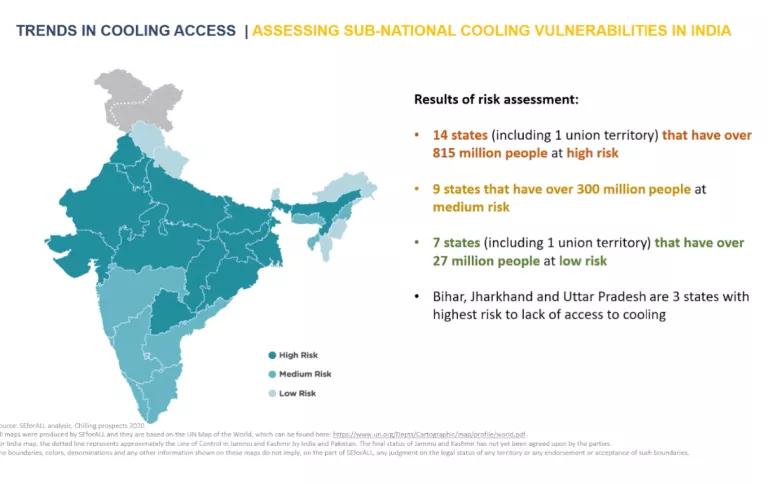
Trends in Cooling Access
Prima Madan is an expert in cooling and energy efficiency working as a consultant with NRDC based in New Delhi.

